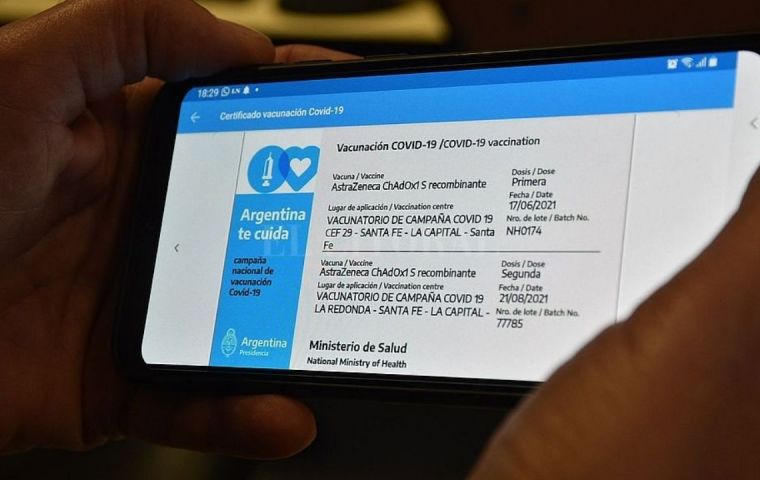MercoPress. South Atlantic News Agency
Argentina ready to launch nationwide health pass
 “Clients” have reportedly tried to bribe nurses into signing their vaccination cards without actually getting injected
“Clients” have reportedly tried to bribe nurses into signing their vaccination cards without actually getting injected Health ministers of all Argentine jurisdictions gathered under the Federal Council known as COFESA, Monday announced the guidelines for a nationwide Health Pass had been agreed upon and that its final details were to be specified shortly.
However, press reports circulating all over Argentina Monday, advanced the main features of the new restrictive credential are that it will be required:
- - for people aged 13 and over
- - for events attended by over 1,000 people
- - for group trips
- - for private gatherings at indoor spaces
The measure will take effect 20 days after the administrative decision is published in the Official Gazette.
According to Federal Health Minister Carla Vizzotti, the application time between the second and third doses has been shortened from six to five months.
The entire Argentine population will be given 20 days to process the pass once it is implemented, which would allow people who have yet to take the second dose to get injected. Vizzotti insisted that “we must continue to start and complete vaccination schedules in children, adolescents, young adults and apply reinforcements.”
In a related decision, Argentine authorities have ordered all inbound travellers from Africa must undergo mandatory isolation, while a PCR test will be requested from those who return from abroad.
In this sense, COFESA agreed to apply the booster dose as of the fifth or sixth month after having completed the vaccination schedule with the second or third dose, as appropriate, and according to the plans of each jurisdiction.
Vizzotti also described the first case of the Omicron strain in Argentina: It is a 38-year-old man who returned to Argentina from South Africa, via the United States, on November 30. After two negative tests, he travelled by car to San Luis in a rental car with a driver. Once at home, he learned that the people with whom he had been in contact while in South Africa has tested positive for Omicron. Therefore and despite being asymptomatic he voluntarily underwent new tests, which came out positive. Vizzotti explained that all of his close contacts are isolated and that everyone remained asymptomatic.
The Argentine provinces of Salta, Tucumán and Buenos Aires have already implemented Health Passes of their own and local jurisdictions, in general, will have ample room to adapt the national health pass to their particular situations.
Although health authorities insist Argentines are not defiant to getting vaccinated, fake passes have already been made available through the internet in Tucumán. Local police are said to be investigating both sellers and buyers. Other press reports have mentioned “clients” had tried to bribe nurses into signing their vaccination cards without actually injecting them.




Top Comments
Disclaimer & comment rulesCommenting for this story is now closed.
If you have a Facebook account, become a fan and comment on our Facebook Page!